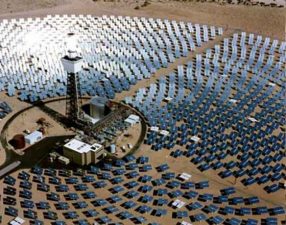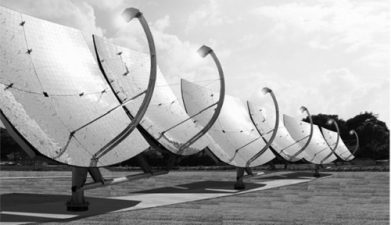[youtube]http://www.youtube.com/watch?v=osHCbW9orV0[/youtube] Even as they sound an important climate change alarm for Middle Eastern viewers, AFED’s endorsement of MASDAR and KAUST deserves its own alarm.
At Green Prophet, we have lamented environmental inaction in the Middle East for a long time. Ridiculous artificial island schemes and dying rivers, such as the Jordan, are only 2 examples from a long list that both reveal and threaten the region’s stability. The Middle East does not spew the kind of emissions seen in the United States, China, or India, but many countries in the region are blinded by fossil fuel wealth, which obscures the attendant environmental decay. The Arab Forum for Environment and Development (AFED) released a powerful 12 minute documentary that finally sounds the alarm.
The wave of the future: higher temperatures and higher seas
Called Wet and Dry, the documentary launches deep into the crux of climate change: the potential that human activities could lead to a 5 degree Celsius temperature increase by 2100 and a sea level increase of 59cm, according to statistics published by the International Panel on Climate Change (IPCC).
A “1m rise [in sea levels] will directly affect 3 – 4% of the population in Arab countries,” according to Dr. Mostafa Kamal Tolba, the former Executive Director for the United Nations Environmental Program (UNEP), and overwhelm an area 4 x the size of Lebanon.
Despite these pressing issues, the narrator draws attention to the irony that while the Maldives is moving their population in land, to prepare for future sea level increases, in the Middle East, Arab countries are “racing to build artificial islands.”
The nightmare scenario
Najib Saab, AFED’s Secretary General, narrates the importance of fresh water, which will become increasingly scarce, and food production, which is expected to drop by 50% if new crops are not introduced.
Infectious diseases will increase. Malaria will spread. And there will be more cases of dyspnea and sun stroke as temperatures continue to rise.
All of these statistics and images generate a frightening momentum for even the most dissident viewer, and then culminates in the typical bottom line for all economies in the throes of globalization: money.
“Tourism is one sector of the economy highly vulnerable to climate change,” according to Saab. Rising temperatures will make many Middle Eastern destinations unbearably hot, subject to extreme weather and scarce water supplies, as well as ecosystem degradation. As such, tourism should push for inland activities centered more on culture and entertainment.
Biodiversity is addressed as well, noting that after only a 2 degree rise in temperatures, 40% of species are already likely to become extinct. Another serious issue is land use and urban planning regulations.
“Choices for construction materials used for buildings and roads do not take into account the risk of rising temperatures,” according to Professor Hamed Assaf from the Faculty of Engineering and Architecture, AUB. As a result, “75% of buildings, roads, and other infrastructure could be destroyed as climate change continues to morph our planet.
Is there an upside?
There is if governments take the hint and introduce serious measures to at least keep temperatures from surpassing a 2 degree increase. And they should ditch short-term thinking in favor of long-term planning.
Wet and Dry draws attention to the absence of concerted research, which is good, as well as programs such as MASDAR and KAUST as anecdotes – not good. Both MASDAR and KAUST are flashy efforts to maintain the status quo, a cultural model that has to be reigned in if our quality of life is ever to be restored.
More Responses to Climate Change in the Middle East:
Syria’s Master Plan for Renewable Energy




I hope so too.
I agree that it delivers a powerful message to the Middle East. I hope it catches on.
Is this like the “Inconvenient Truth” for the Arab world?